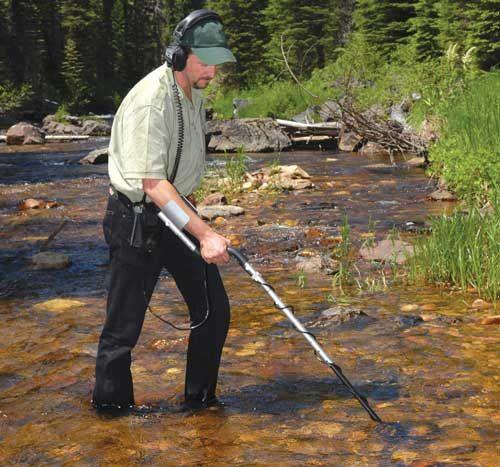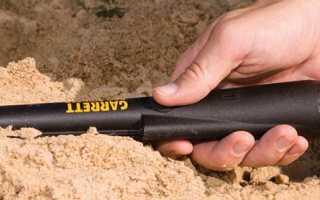best reviews metal detectors for gold
Interesting information about treasure hunters
When searching for finds, the soil will always affect the input of the receiver coil. This is expressed in two “harmful” effects; - weakening of the sounding signal of the metal detector and response from the target, the signal from the ground (noise).
Ground can have properties of electrical conductivity due to the presence of salts dissolved in the ground water. Some soils, especially those with high iron and salt content, affect the input quite powerfully - the signal received by the metal detector from the soil can be 1,000 times stronger than the signal from a metal object buried in the ground on the ground enough depth. The signal from the ground also changes much when lifting and lowering the ring - passing on the embankment or over the pit. Small changes in soil characteristics with stones can lead to brief changes in the input. These changes can generate “targeted-like” signals in the device. They can embarrass the operator because they are defined by sound as metal objects. Examples of heavy soil: Red clay, the transition between dry and wet sea sand, soil with small inlays containing iron compositions or stones (iron, pyrite, magnesite).
Ground can have properties of electrical conductivity due to the presence of salts dissolved in the ground water. Some soils, especially those with high iron and salt content, affect the input quite powerfully - the signal received by the metal detector from the soil can be 1,000 times stronger than the signal from a metal object buried in the ground on the ground enough depth. The signal from the ground also changes much when lifting and lowering the ring - passing on the embankment or over the pit. Small changes in soil characteristics with stones can lead to brief changes in the input. These changes can generate “targeted-like” signals in the device. They can embarrass the operator because they are defined by sound as metal objects. Examples of heavy soil: Red clay, the transition between dry and wet sea sand, soil with small inlays containing iron compositions or stones (iron, pyrite, magnesite).
Fortunately, the phase shift of the received signal from the soil remains fairly constant within a certain area of the Earth’s surface, and the changes in the signal phase caused by the presence of a metal target are small and short-lived. This requires digital electronic circuits to detect and filter out these short-term changes, against the backdrop of a powerful but constant signal from the ground (noise).
The ground metal detector has a means of compensating and eliminating the “harmful” effects of the earth - a function of setting on the ground (Ground Balance). To remove false signals, you usually need to adjust sensitivity downwards. The option directly related to sensitivity is the depth of detection. When searching, it is always advisable to find finds deep underground. Good deposition from the ground also makes it possible to determine with great accuracy, both the location of the object, and to estimate the depth of its laying.
The ground metal detector has a means of compensating and eliminating the “harmful” effects of the earth - a function of setting on the ground (Ground Balance). To remove false signals, you usually need to adjust sensitivity downwards. The option directly related to sensitivity is the depth of detection. When searching, it is always advisable to find finds deep underground. Good deposition from the ground also makes it possible to determine with great accuracy, both the location of the object, and to estimate the depth of its laying.
Modern metal detectors, depending on the methods of setting and methods of processing signals, the function of compensating the soil effect can be divided into 3 types;
1. Automatic (pre-installed) adjustment of the ground balance.
2. Automatic. with the ability to manually adjust the balance of the ground.
3. Automatically monitoring the balance of the soil.
1. Automatic (pre-installed) adjustment of the ground balance.
2. Automatic. with the ability to manually adjust the balance of the ground.
3. Automatically monitoring the balance of the soil.
what does discrimination mean on a metal detector
Very powerful yet simple home made metal detector DIY
Simple metal detector on two chips NE 555
Smartphone Homemade metal detector
Tesoro Tejon vs Garrett ACE 250 discrimination test
Very powerful yet simple home made metal detector DIY
Simple metal detector on two chips NE 555
Smartphone Homemade metal detector
Tesoro Tejon vs Garrett ACE 250 discrimination test
Video how to make a metal detector
Where to look for a metal detector
Where to look with a metal detector
Where to dig with a metal detector by law
Where to find a metal detector
Where to look for a metal detector
Where to find a metal detector
What a metal detector is for
How to choose a metal detector
How to choose a metal detector to search
How to look without a metal detector
How to look for a metal detector
What's the name of the metal detector
How to find gold metal detector
How to find metal detector
How to set up a metal detector
How to set up a metal detector
How to set up a garrett metal detector
How to set up a metal detector x terra 705
How to set up a metal detector garrett
How to set up a metal detector
How to check the metal detector
How to pass a metal detector
How the metal detector works
As a metal detector itself
How to make a metal detector at home
How to make a reel on a metal detector
How to make a metal detector pirate
How to make a metal detector with your hands at home
How to make a powerful metal detector
How to make a simple metal detector
How to make a homemade metal detector
How to assemble a metal detector pirate
Stores where metal detectors are sold
Metal detector for gold how to choose
Metal detector how to choose to search for gold
What to find a metal detector
What they find as a metal detector
What is a metal detector
Where to look for a metal detector
Where to look with a metal detector
Where to dig with a metal detector by law
Where to find a metal detector
Where to look for a metal detector
Where to find a metal detector
What a metal detector is for
How to choose a metal detector
How to choose a metal detector to search
How to look without a metal detector
How to look for a metal detector
What's the name of the metal detector
How to find gold metal detector
How to find metal detector
How to set up a metal detector
How to set up a metal detector
How to set up a garrett metal detector
How to set up a metal detector x terra 705
How to set up a metal detector garrett
How to set up a metal detector
How to check the metal detector
How to pass a metal detector
How the metal detector works
As a metal detector itself
How to make a metal detector at home
How to make a reel on a metal detector
How to make a metal detector pirate
How to make a metal detector with your hands at home
How to make a powerful metal detector
How to make a simple metal detector
How to make a homemade metal detector
How to assemble a metal detector pirate
Stores where metal detectors are sold
Metal detector for gold how to choose
Metal detector how to choose to search for gold
What to find a metal detector
What they find as a metal detector
What is a metal detector
Comments & Responses
Leave a Reply
Your email address will not be published. Required fields are marked *
Comment
Leave a Reply
Your email address will not be published. Required fields are marked *
Comment
Name *
Email *
Website
What is a metal detector and how it works
How the metal detector works and more for beginners
What is a metal detector and how does it work?
How manual and arched metal detector works
Best metal detector for gold
What can be found with a metal detector?
What can be found with a ground metal detector
Options for balancing the ground of metal detectors
What benefits can be brought to treasure hunters of downpours
What can you find with a metal detector?
How to use a metal detector and what to find
What can i find with a metal detector?
Looking for a treasure without a metal detector
Finds that can be made with a metal detector
Is it possible to find a treasure in Estonia and what to do if something valuable has fallen into your hands?
Named places where in the suburbs with a high probability you can find a treasure
What and where can be found with a metal detector?
How the metal detector works and more for beginners
What is a metal detector and how does it work?
How manual and arched metal detector works
Best metal detector for gold
What can be found with a metal detector?
What can be found with a ground metal detector
Options for balancing the ground of metal detectors
What benefits can be brought to treasure hunters of downpours
What can you find with a metal detector?
How to use a metal detector and what to find
What can i find with a metal detector?
Looking for a treasure without a metal detector
Finds that can be made with a metal detector
Is it possible to find a treasure in Estonia and what to do if something valuable has fallen into your hands?
Named places where in the suburbs with a high probability you can find a treasure
What and where can be found with a metal detector?

